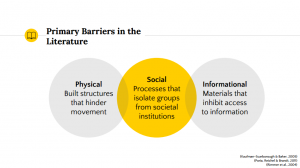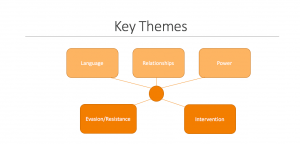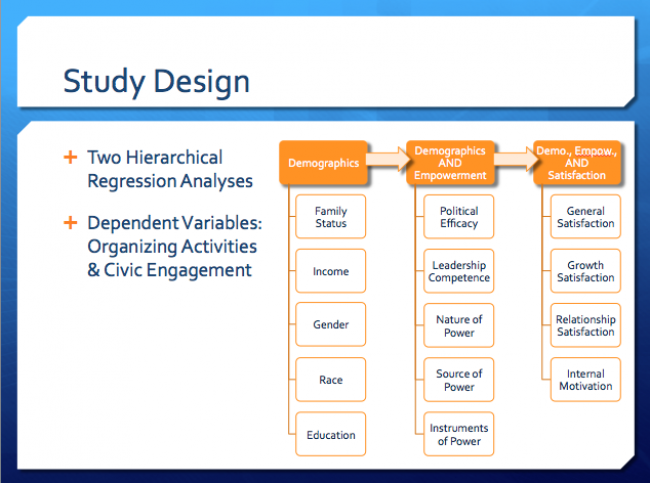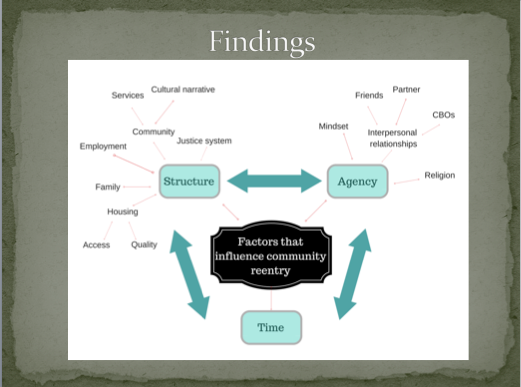Home » Final Projects and Theses » 2016 CDA Theses Abstracts
2016 CDA Theses Abstracts
Posted by Michelle Wijaya on Thursday, May 19, 2016 in Final Projects and Theses, Theses.
Congratulations to the following students who defended their thesis this past spring: Dessie Clark, Leah Samples, Erin McCauley, and Ryan Schooley. Below are abstracts of their work. Feel free to contact the authors with any questions you have about their research.
Disabling Barriers to Community Participation from the Perspective of Visually Impaired Adults
Leah Samples, M.Ed 2016
 The purpose of this research is to explore commonly experienced barriers to participation in the lives of adults who are blind in leisure settings (e.g. restaurants, stores, etc.). Research indicates that barriers to participation persist despite a long history of legislation designed to support equal opportunity for disabled people. Historically, the focus has been placed on structural barriers, but newer research highlights the importance of looking at social and informational barriers to participation. Collectively, these barriers prevent disabled people from fully engaging in community life and consequently from achieving full citizenship. Disability is crucial to understanding the meaning of citizenship. Drawing upon the influences of feminist, critical race, and human rights theorists, citizenship can be defined as a set of rights and responsibilities that an individual has because they are a part of a community. However, when those rights are taken away or denied, one’s citizenship is in question. Employing this definition of citizenship allows one to examine how barriers to citizenship present themselves in societies that are built on an ideal of a non-disabled person. To understand at a deeper level how this notion of citizenship manifests itself, this study employs critical citizenship framework to analyze commonly experienced barriers to participation in the lives of adults who are blind in leisure settings (e.g. restaurants, coffee shops, and stores). This research will examine barriers in leisure settings thus furthering the field of disability studies. A qualitative study design will be applied with 30 semi-structured interviews and 5 participant observations in leisure settings serving as the data sources. The general research method of Grounded Theory will be employed to identify key themes in the data to be collected.
The purpose of this research is to explore commonly experienced barriers to participation in the lives of adults who are blind in leisure settings (e.g. restaurants, stores, etc.). Research indicates that barriers to participation persist despite a long history of legislation designed to support equal opportunity for disabled people. Historically, the focus has been placed on structural barriers, but newer research highlights the importance of looking at social and informational barriers to participation. Collectively, these barriers prevent disabled people from fully engaging in community life and consequently from achieving full citizenship. Disability is crucial to understanding the meaning of citizenship. Drawing upon the influences of feminist, critical race, and human rights theorists, citizenship can be defined as a set of rights and responsibilities that an individual has because they are a part of a community. However, when those rights are taken away or denied, one’s citizenship is in question. Employing this definition of citizenship allows one to examine how barriers to citizenship present themselves in societies that are built on an ideal of a non-disabled person. To understand at a deeper level how this notion of citizenship manifests itself, this study employs critical citizenship framework to analyze commonly experienced barriers to participation in the lives of adults who are blind in leisure settings (e.g. restaurants, coffee shops, and stores). This research will examine barriers in leisure settings thus furthering the field of disability studies. A qualitative study design will be applied with 30 semi-structured interviews and 5 participant observations in leisure settings serving as the data sources. The general research method of Grounded Theory will be employed to identify key themes in the data to be collected.
“Boys Will Be Boys”: Assessing the Attitudes of Athletic Officials on Sexism & Violence Against Women
Dessie Clark, M. Ed 2016
The purpose of this research is to explore how athletic officials identify and understand violence against women. Scholars theorize hegemonic forms of masculinity that depict men as strong, aggressive, and dominant may be perpetuated by sports culture, and thus coaches can be an effective site of intervention for changing this culture.Therefore, it is important to determine how the influential relationship between athletes and athletic coaches can be used to promote healthy gender relations within communities. This study uses a mixed-methods approach to assess athletic coaches’ knowledge, beliefs, and behaviors on issues related to masculinity, sexism and violence against women. However, this article focuses on the qualitative portion of this study with a subset of participants (n=19). This study showcases the logical fallacies athletic coaches use to justify the presence of violence against women in athletics. Furthermore, this research identifies athletic coaches conflict over the roles they play in their athletes lives. Due to limited and conflicting research in this area, it is important to offer insight into the ability of athletic coaches to act as mentors to athletes in order to prevent sexual and domestic violence and promote healthy masculinity. Questions? Contact Dessie Clark: dessieleeclark@gmail.com
athletic coaches use to justify the presence of violence against women in athletics. Furthermore, this research identifies athletic coaches conflict over the roles they play in their athletes lives. Due to limited and conflicting research in this area, it is important to offer insight into the ability of athletic coaches to act as mentors to athletes in order to prevent sexual and domestic violence and promote healthy masculinity. Questions? Contact Dessie Clark: dessieleeclark@gmail.com
Does Organization Matter? Assessing Engagement Within and Beyond Community Organizing Coalitions
Ryan Schooley
 Community organizing is a participatory process in which individuals affected by social issues exert power through collective action. This process aims to affect change by combating systemic issues at the local level and requires engagement from community members. The current study explores which factors are significant predictors of engagement for volunteers within a faith-based community organizing network. Two dependent variables are examined and compared: one measuring participation in activities explicitly sanctioned by the organizing coalition, and another concerning civic engagement more broadly constructed. Potential predictors stemming from three overarching areas are analyzed: demographics, empowerment, and perceived organizational satisfaction. This study utilizes survey data collected by organizational leaders in the community organizing network. Results show that demographic factors were not predictive of engagement for either dependent variable, emotional empowerment was more predictive of engagement than cognitive empowerment, and perceived organizational satisfaction, specifically perceived satisfaction concerning individual growth, predicted engagement in organizing activities but not civic engagement more broadly constructed. Findings concerning empowerment and perceived organizational satisfaction extend previous work related to empowerment theory and social exchange theory. By understanding which factors lead to greater engagement within their members, community organizing networks may be able to create conditions that lead to more sustained engagement and long-term participation, thus increasing their ability to create change. Questions? Contact Ryan Schooley: rschooley11@gmail.
Community organizing is a participatory process in which individuals affected by social issues exert power through collective action. This process aims to affect change by combating systemic issues at the local level and requires engagement from community members. The current study explores which factors are significant predictors of engagement for volunteers within a faith-based community organizing network. Two dependent variables are examined and compared: one measuring participation in activities explicitly sanctioned by the organizing coalition, and another concerning civic engagement more broadly constructed. Potential predictors stemming from three overarching areas are analyzed: demographics, empowerment, and perceived organizational satisfaction. This study utilizes survey data collected by organizational leaders in the community organizing network. Results show that demographic factors were not predictive of engagement for either dependent variable, emotional empowerment was more predictive of engagement than cognitive empowerment, and perceived organizational satisfaction, specifically perceived satisfaction concerning individual growth, predicted engagement in organizing activities but not civic engagement more broadly constructed. Findings concerning empowerment and perceived organizational satisfaction extend previous work related to empowerment theory and social exchange theory. By understanding which factors lead to greater engagement within their members, community organizing networks may be able to create conditions that lead to more sustained engagement and long-term participation, thus increasing their ability to create change. Questions? Contact Ryan Schooley: rschooley11@gmail.
Process of Community Reentry for Previously Incarcerated Males with Child Support Obligations
Erin McCauley, M. Ed 2016
This paper explores the process of community reentry for previously incarcerated adult males with child support obligations in light of the structure versus agency discourse. Concurrent triangulation was used to identify barriers and facilitators to community reentry for this unique population, explore those findings in light of the structure versus agency discourse, and identify areas for further inquiry and program development. Findings include the structural nature of barriers to community reentry, the importance of interpersonal relationships and motivation in successful community reentry from the perspective of the participants, and the influence of extended periods of physical and social isolation on agency for this population. Implications for practice, policy, and inquiry are discussed. Questions? Contact Erin McCauley: mccauley.erin@comcast.net
population, explore those findings in light of the structure versus agency discourse, and identify areas for further inquiry and program development. Findings include the structural nature of barriers to community reentry, the importance of interpersonal relationships and motivation in successful community reentry from the perspective of the participants, and the influence of extended periods of physical and social isolation on agency for this population. Implications for practice, policy, and inquiry are discussed. Questions? Contact Erin McCauley: mccauley.erin@comcast.net
Tags: Theses
Connect with Vanderbilt
©2024 Vanderbilt University ·
Site Development: University Web Communications